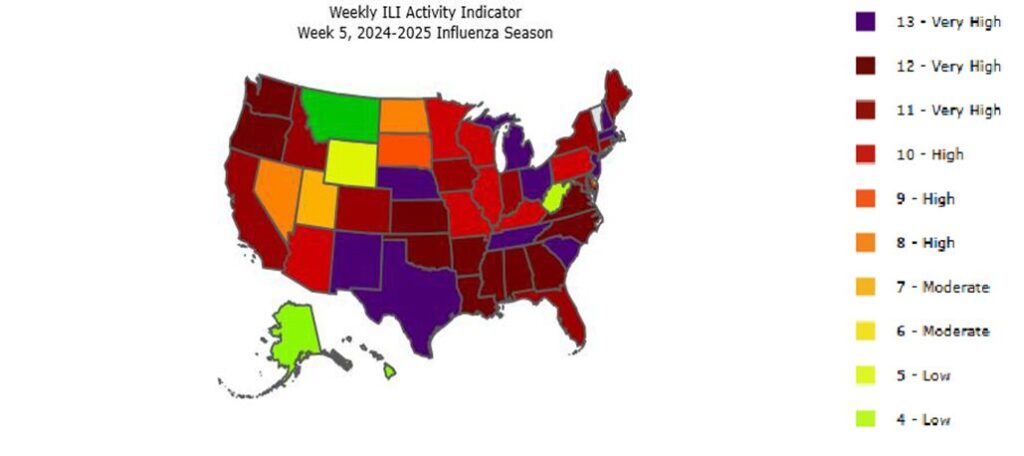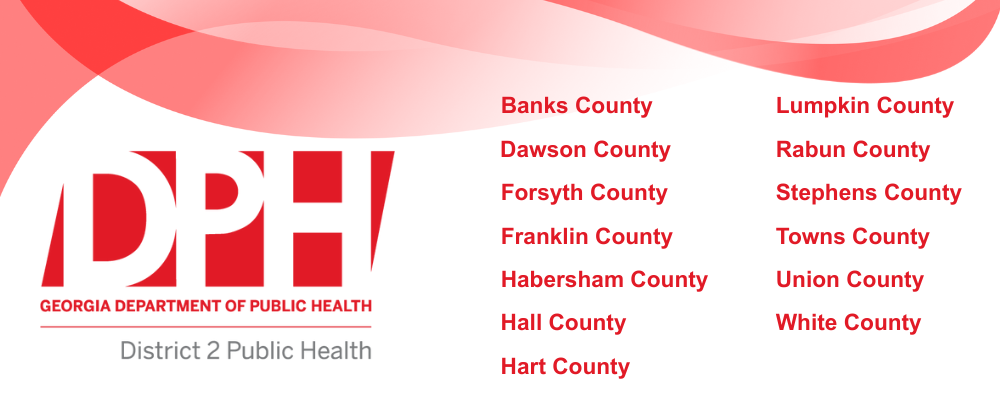Week 5
(Ending February 01, 2025)
Viral Respiratory Diseases Surveillance
Pan-Respiratory Virus Surveillance (Georgia- last updated 1/25/2025)

Georgia Flu Surveillance Update
As of Week 5, Georgia flu activity was Very High= 12 (on the scale of 1-13). Activity levels are based on the percent of outpatient visits in Georgia due to Influenza-like illness during this timeframe.
For the corresponding week, the percentage of outpatient visits for Influenza-like Illness was 8.4% (which is above the regional baseline of 3.2%), the number of influenza-associated death was 0 (25 total for the current ILI season); the number of Metro Area Influenza Hospitalizations was 340 (2,972 total for current Flu season); and the number of Influenza Outbreaks was 34 (98 total for current Flu season).

ILI (Influenza-like Illness) Percentages by Season

ILI (Influenza-like Illness) Percentages by Age

COVID-19 Snapshot in Georgia

Respiratory Syncytial Virus Infection (RSV) Surveillance
Data from NREVSS are also analyzed to measure the RSV seasonality. Antigen and polymerase chain reaction (PCR) tests are analyzed separately to determine the start and end of RSV season. Season onset is defined as the first week of two consecutive weeks when the percent positive of ALL laboratory confirmed tests are greater than or equal a certain threshold. The end is defined as the first week of two consecutive weeks when the percent positive of ALL lab confirmed tests are less than a certain threshold. For antigen-based testing, the threshold is 10% and for PCR the threshold is 3%.
During week 5 clinical laboratories in Georgia reported testing 4,295 (3.0% positive) antigen specimens and 2,505 (2.3% positive) PCR specimens.

Highly Pathogenic Avian Influenza (HPAI) Update:
HPAI has been identified in a commercial poultry flock and backyard flocks in the State of Georgia alongside an increasing number of cases nationwide. We know that H5 is circulating in wild birds in the US and sporadic detections in GA are inevitable especially in backyard scenarios where chickens and/or other birds will have more direct contact with wild birds. Risk to human health remains very low overall and does not represent increased risk to the general public in Georgia yet Avian Influenza continues to be of highest concern in people with known exposure to sick animals who are either not wearing PPE or are under-protected (i.e. breaches, partial PPE use, etc.). We work closely with Department of Agriculture colleagues in these events to rapidly get information on humans involved and with exposure. Avian Influenza (AI) is a reportable disease in Georgia. Health providers in GA should continue to call 866-PUB-HLTH (866-782-4584) to notify the state health department immediately if a patient with Flu A (unsubtyped/unsubtypable) or suspect flu fits the epidemiological risk factors for H5 infection, so we can fast track and prioritize testing and/or receipt of results. This is a time where a call to public health would be appropriate if they have a Flu A positive or suspicion of Flu in a patient AND they report of epidemiology risk factors.
The US situation in animals is best found on the USDA website: https://www.aphis.usda.gov/livestock-poultry- disease/avian/avian-influenza/hpai-detections
Questions regarding animal health should always be directed at the Department of Agriculture. However, some helpful information about AI surveillance can be found here: https://agr.georgia.gov/avian-influenza and on the USDA pages: https://www.aphis.usda.gov/livestock-poultry-disease/avian/avian-influenza (this also includes links for the sick bird line). If you have concerns about AI in birds, call the Georgia Avian Influenza hotline at 770-766-6850 or visit https://www.gapoultrylab.org/avian-influenza-hotline/.
Getting vaccinated is the best thing you can do to protect yourself and others.
District 2 health departments have vaccines available. Please contact your local health department for information on how to get your vaccine at http://phdistrict2.org/contact-us.
To learn more about how to protect yourself against flu and other respiratory diseases, visit DPH website at https://dph.georgia.gov/epidemiology/acute-disease-epidemiology/viral-respiratory-diseases and CDC website at https://www.cdc.gov/flu/
All Georgia physicians, laboratories, and other health care providers are required by law to report notifiable diseases. Instructions, including notifiable conditions and the timeframe in which they are reportable can be found at https://dph.georgia.gov/epidemiology/disease-reporting. Georgia tracks the listed conditions statewide using multiple overlapping surveillance systems, especially in the case of viral respiratory diseases as some are not reportable at the individual case level.
